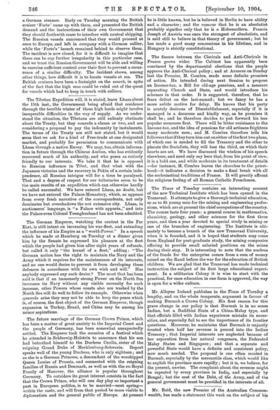The fissure between the Clericals and Anti-Clericals in France grows
wider. The Cabinet has apparently been convinced by the departmental elections that the people approve the Anti-Clerical policy ; and at Auxerre on Sunday last the Premier, M. Combos, made some definite promises of action. He intended during next Session to propose an Income-tax, a Bill for old-age pensions, and a measure separating Church and State, and would introduce his schemes in that order. It is suggested, therefore, that he fears defeat on the last-named; but we fancy he has a more subtle motive for delay. He knows that his party is acutely desirous of Disestablishment, especially if it is managed in a decorous and kindly way, as he promises it shall be ; and he therefore decides to put forward his less popular measures first. There will be bitter resistance to the Income-tax, and the idea of pensions for old artisans frightens many moderate men; and M. Combos therefore tells his followers that if they turn him out on either of the first two plans, of which one is needed to fill the Treasury and the other to placate the Socialists, they will lose the third, on which their hearts are set. We have discussed the wisdom of his speech elsewhere, and need only say here that, from his point of view, it is a bold one, and while moderate in its treatment of details —for instance, M. Combes leaves the churches to the priest- hood—it indicates a decision to make a final break with all the ecclesiastical traditions of France. It will greatly affront the religious feeling of all Roman Catholic Frenchmen.


































 Previous page
Previous page